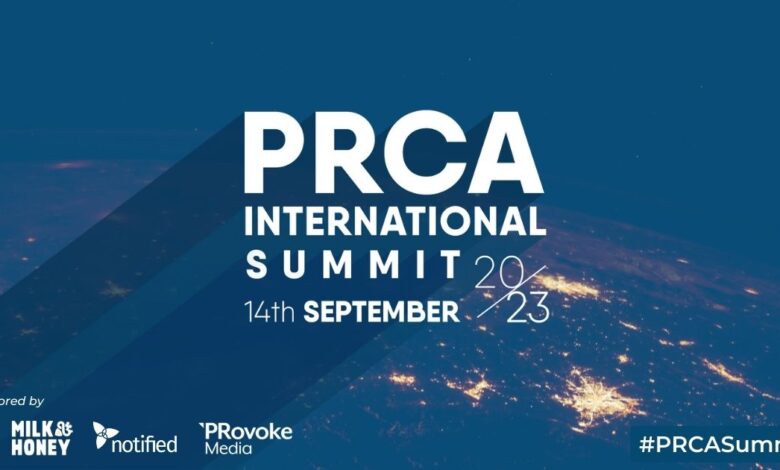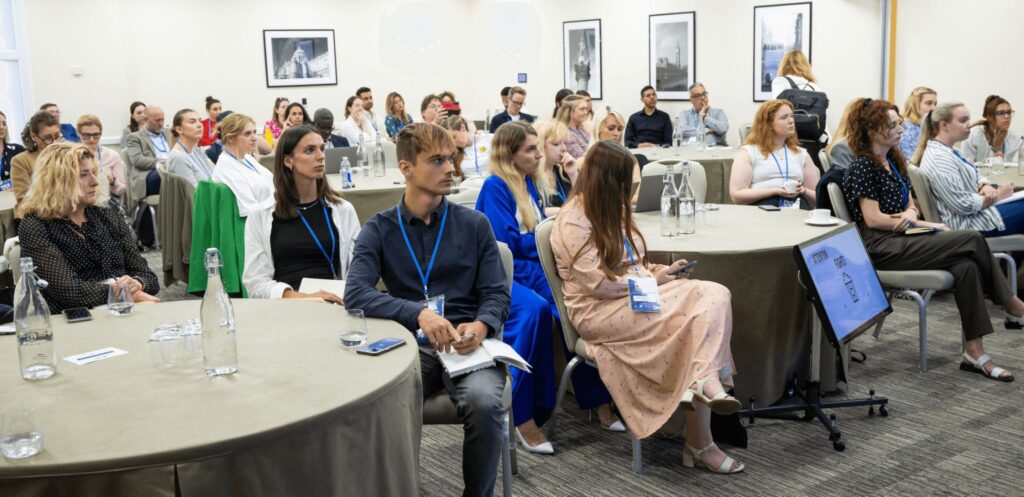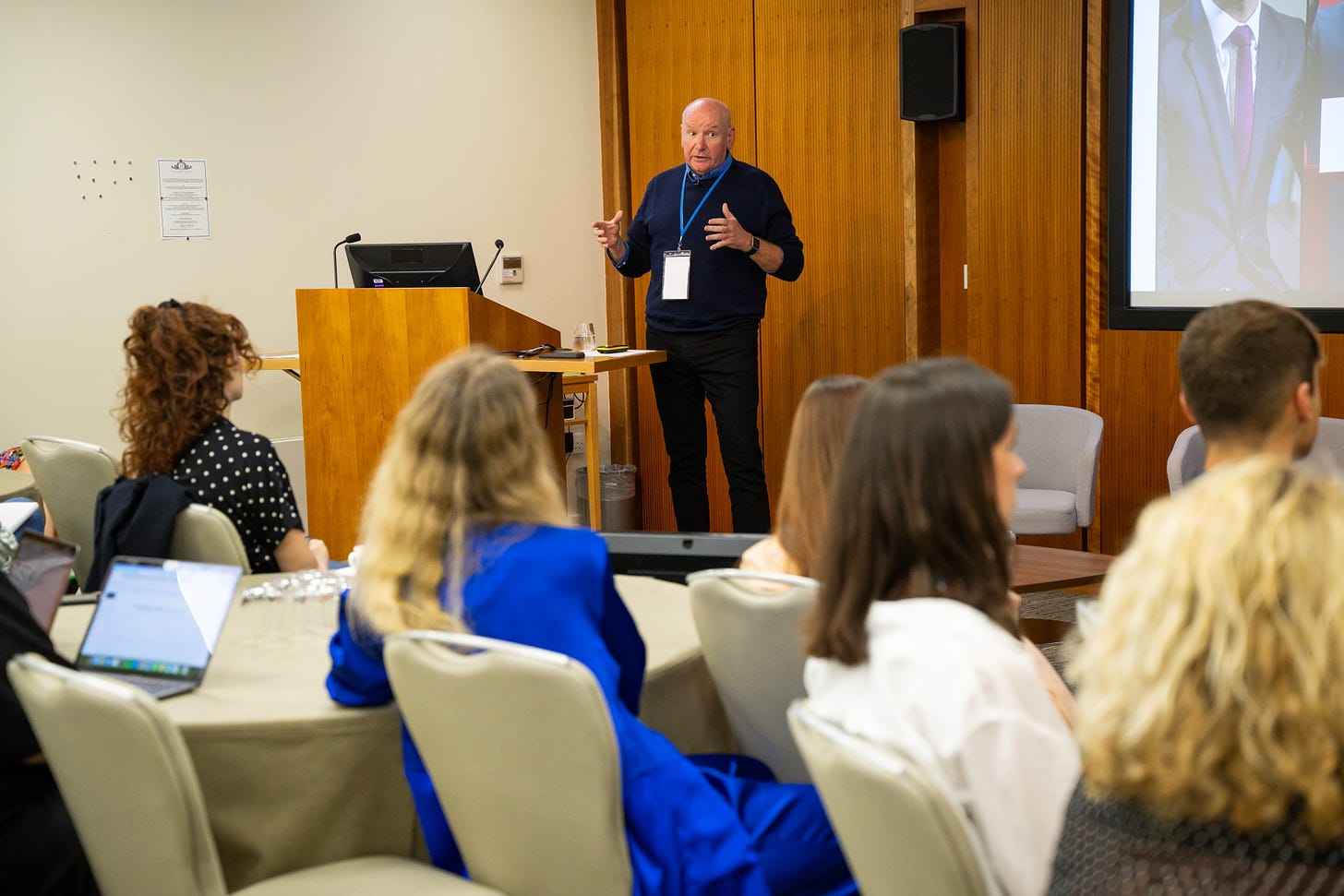
Last week on Thursday I was kindly invited to speak and moderate a panel at PRCA’s International Summit, maybe to your surprise or not, about AI. What a shock. Although this is a wider review of how the PR sector are adopting AI, I am going to give the PRCA Summit a score out of 10.
It gets a 7.1 out of 10. It was good overall. Think the problem is it’s significantly geared toward PR and comms agencies. Which is never a healthy relationship as it’s basically a room full of competitors. But overall the PRCA did a great job of putting together a conference that is important for their members to consider.
Its similar to when you go to a tech event and it’s just full of tech vendors who although don’t necessarily compete, they don’t want to buy a new service. This is kind of the vibe at AI Summit in London run by Informa. I love the team that runs that event. But I think they are seriously missing a trick with the vendor-to-enterprise ratio. But that’s a story for another day.
At first wasn’t exactly sure why I’d be going to speak about AI at an event that is focussed on public relations and communication. But I’m glad I did. And was great to see people paying attention, referencing AI throughout the day, and seeing attendees have a vested interest in the topic.
PR and Comms is an area I’m not massively fond of which I’ve explained below why. But I have to give credit to the PRCA as they are putting events, training, and guides on getting to know about AI and the impact it can have on a PR-focused business or team.
The title of the panel conversation was called ‘AI-Powered PR: How Artificial Intelligence is Rapidly Changing the Game in PR’. On this panel with me was Manuel Hüttl from Milk & Honey PR, Lara Sous from MG Motors, Bryan Turner from Clockwork, and Oriana Medlicott from Fujitsu.



I wasn’t aware of how much thinking was going into the realm of AI for this sector. Through the various panels and keynotes, AI was a topic that was repeatedly mentioned. However, I still don’t see much action from what agencies and in-house teams are doing with AI. Seems more talk than action at the moment.
The panel was brilliant to be on, although everyone was virtual apart from me. Which is a bit upsetting as I like to have the energy of everyone in the room. Everyone had their own nuggets of wisdom to share. Especially Orianna as with her role in Fujitsu, doesn’t operate in the marketing or PR area on a regular basis. And with Bryan looking at it from a data view, it brought a fantastic dynamic for the 45-minute session.
And as a heads up this isn’t an article reviewing the conference similar to my recent review of the CogX festival that was the same week. It’s simply a reference to how attending this summit got me thinking about a wider picture of ways PR and the comms sector are pivoting and adapting to the great and terrible power AI can bring with it.
Before I go into how it’s been made clear to me ways AI is impacting the PR and Comms sector, I want to give you my personal take on the agencies that make up the bulk of this industry.
The reasons below are why I honestly think PR and Comms is one of the industries at risk of shrinking significantly in terms of businesses and agencies operating in the space. Or a worse potential, not being needed due to the increased use and faster learning of AI to do more at scale.
You might be wondering what the below has to do with the topic of what my personal opinion of the PR and Comms world has to do with AI. Well, it’s hand in hand because AI has the potential to do a lot of what I’m currently seeing from a PR and Comms business.
And I’ve had people including an agency owner tell me this is not what they do when I’ve got into a discussion about it on LinkedIn that’s linked below.
But it is honestly all I am consistently seeing. So please, if you are a PR and comms professional, tell me where I am going wrong.
And if you think it’s an attack on you personally, it’s not. There are other business models and industries I think will have the same happen to them with another being the example of translation services or being a translator.
Questioning what PR and Comms agencies do
I was never aware of what PR and comms agencies or in-house teams did for a living up until I started my own business. And I still don’t think I know much about it because people working on it tell me it’s so much more but the parts mentioned are the ones I never see? Considering I’ve worked in marketing for nearly all my time before going off on my own, quite surprising.
I always look at PR and comms and think they could be doing so much more. A lot of agencies that pitch to me or email us really don’t seem to have a sense of relationship-building for themselves. Even though for me, this is a critical part of what they are selling to a customer.
In my inbox under the folder ‘press releases’ currently, I have 1,977 emails, 118 of which are unopened. And they only go in that folder if they are simply a press release. Now I’m not saying a press release is a bad thing. They are helpful occasionally, especially if they are stats on a market trend. But I’d say about 85-90% of them I receive are garbage that I wouldn’t be surprised if they are pushing out to meet a quota against its agreed contract with the company.
But it baffles me this is the way PR and comms companies mainly operate and is the only seemingly core product across the agencies to what can be a hefty retainer or monthly fee. I honestly don’t really know what else a PR company does besides this?
Although to be fair, sometimes they do offer commentary or interviews. This is a nice shake-up from the standard emails I get that sometimes don’t have a ‘Hello’ or ‘Hi’ or ‘Hi Editor’ and just have the press release like it’s going to wow me. And sometimes, such as in the case of Zeno Group, where I got an invite to ServiceNow’s 2022 Knowledge, its company-wide conference for customers and partners, in The Hague, Netherlands. Which is probably the best offer I’ve received from a PR and communications agency.
For example, this is the email I got today from a PR company called Lunar PR that I have never dealt with in my life:
Dear Editor,
I hope all is well.
Please find the attached press release on the topic “Chappyz set to Collaborate with ByBit to Support Community Growth”. It would be a great help if you could publish it in your esteemed publication.
In the words of Claude Littner “I mean, you’re taking the piss, please leave”. Or better in the words of Roy Hodgson below.
Am confused by how these agencies think that is a sign of quality. And don’t understand how they convince huge enterprise customers to pay top dollar for what seems to be a press release that puts their customer as the ‘leading’ brand in that arena. And they claim to do so much more, but this is honestly the only thing I see them do.
There are rarely PR and comms agencies that I come across that have a vested interest in getting to know who we are and how they can help us. Maybe it’s because we’re not big enough of a media publication in their eyes? Or maybe that relationship-building service is reserved for current or potential customers?
Seems Business 101 to me to invest in key relationships. It baffles me that PR companies are the ones that advertise they are great at it – relationships with the press and key contacts. And are showcasing that they specialise in this key area with the right people that can get them seen or heard.
Yet they don’t seem to want to invest any time in having a call (apart from time to time ringing to quickly say they have a press release under embargo that will be of interest and then rattle off the key findings like the end of the terms and conditions on a radio advert), taking out for lunch to get the inside scoop, or putting on any form of events. But advertise themselves as the ones to handle these relationships?
Here’s a tip for anyone working in this sector, if you only work on an ‘editorial’ basis, maybe try building a relationship with the people you’re trying to wow. Or otherwise, get your checkbook out. And I don’t have the stats so can’t say it’s fact, but wouldn’t surprise me if they spent money on popular people just to say it’s a great product for what they are pitching. Which is more of a struggle to do in the tech sector than the consumer sector.
But I’m not a company that uses PR and comms agencies so maybe I’m not getting the full, clear picture. And no discredit to the people running these agencies. It’s great money to sit and send mail merges of press releases that increasingly look like the first draft was done in ChatGPT.
And I’m not saying all agencies do this as their full-time job. But it seems this way to me that at least a dozen I know do, as that’s all they send me. Recent examples from this week in my inbox include Zeno Group, Tancredi Group, Finn Partners, Bospar, We-Worldwide, and over the weeks, dozens more.
When I read Stephen Waddington’s LinkedIn post that referenced PR and Comms as being a practice and calling people practitioners, I let out a faint laugh. Comparing what agencies in this arena do to something such as practicing law or medicine, to me, is a joke. But I guess the positive is that Stephen, in his case and I’m sure for at least several others in PR and Comms, takes his role and career passionately.
Anyway, without shitting on the PR and comms industry anymore, I want to turn the focus to how AI is changing the PR and Comms sector.
How AI is changing the PR sector
Funnily enough, after my rant above, I’ve had a press release from Farrer Kane & Co. that referenced a report on AI use in PR. The research from CIPR, the membership rival of PRCA, found that AI tools are assisting with 40% of PR tasks.
That’s a big number and can definitely open the doors for the business and teams doing more. Or vice versa with agency owners or directors realising to drop the people, resources, and technology that aren’t doing much for them.
Additionally to that point, there are areas I would suggest agencies tread carefully and question their team’s use of AI for certain campaigns or tasks. One example is crisis management or crisis response, as the Drum pointed out that it can result in controversy and upset.
Not surprising at all, when I’ve been reading up on this topic and asking large language models, it’s come back with the same answers you would get for other industries and business units. I asked Open AI’s ChatGPT, Google’s Bard, and Anthropics Claude the same question as the heading to this section.
Each of them came back with completely different answers but mentioned a number of the same examples. ChatGPT came back with the most detailed response outlining 12 different ways AI is changing the PR sector, compared to 6 from Claude, and 4 from Bard.
These included:
- Automating content creation
- Improving efficiency
- Personalising the experience at scale
- Sentiment analysis
- Measurement and media monitoring for reporting
But what do these mean specifically to the PR sector? I want to know ways that it can actually do. Which is why I’ve gone into more detail on how it can be used in the next section.
When I typed the heading to this section as a question to Bard, it finished off the response by saying:
It is important to note that AI is not a replacement for human PR professionals. AI can be a powerful tool to help PR professionals work more efficiently and effectively, but it cannot replace the need for human judgment, creativity, and empathy.
I wish that statement had at the end “..and empathy…yet.” And I’m not picking on PR and Comms, that goes for most industries and jobs. As people fail to realise we don’t have 100% certainty about what’s going to happen tomorrow. Let alone in 5, 10, 15, 20 years from now.
One thing that the large language models didn’t include in that prompt, and I looked at it through other stories, is what the impact of AI would be on the business operations of an agency. It is common for me to hear when people talk about AI that they only think about the large language models, not the tools that they are probably using in their day-to-day that are embedded with AI.
Think of when you use Canva for making a design, it now has smart recommendations so your designs are made quicker and then learns from what you feed it for what your style is. When you use Elementor Pro in web design, it has a feature to use AI to develop calls to action or designs on the site quickly. If you use a CRM such as Salesforce, Hubspot, or Zendesk it has AI embedded for smart recommendations with the goal of getting you sales or speaking to contacts quicker. If you use a project management tool such as Monday, Asana, or Notion it will have AI embedded to learn your workflows and priority tasks so you have faster, accurate scheduling for your day.
And it’s amazing when I speak to people about the impact AI is having and they just look at large language models as the say-all and do-all. But when AI is embedded within a product or tool you are using every day you can maximise the output you get from it.
From the conversations last week in London, this is the one aspect the PR and Comms professionals need to pivot the direction of thinking. There is a lot on the use of a chatbot for writing content. But not so much for how it can make their admin tasks easier.
How PR and Comms Professionals Can Use AI
Similar to how any other industry and business can use AI, there are various ways and arguably endless ways to use AI. But the important part of using any technology or capability is asking the question of why you want to use it and what’s the vision or goal of using it.
Having the desired result and the context behind why will likely save you a lot of time, give you a competitive edge, and allow your customers to know exactly who they are buying from.
Imagine you’re going on holiday and departing from the UK. On this trip, you’re going to Barcelona. Now there are different ways you can get to that destination. For example, you can fly, you can drive, you can detour with a stopover in Paris and Toulouse, you can go via another country such as America or Germany, or you can get a cruise via sea. And god knows how many other combinations.
Of course, the fastest route might not be the most ideal or the best use of resources. And if we play with that story again and change the destination to Sydney, it changes everything. It might take a significant increase in resources to get to Sydney, depending on how you want to get there. Although Barcelona might be closer, there are ways the trip can become more expensive than it would be going to Sydney, which is much further, depending on how you want to get there.
And you might read that thinking what the fuck has this got to do with how AI can be used in PR. Well, this story can be applied to a business as well. In this case for PR and Comms agencies or in-house teams.
Especially when thinking and discovering what pieces of SaaS to use, which vendor to use, and what investment in terms of roles in the company to hire for when considering ways AI can be used, including the below examples.
Being crystal clear on where you want to go, why you want to use that piece of software, and how that person fits into your company can put you 10 paces ahead of your competitor.
Saying that, made me think that Bryan Turner from Clockwork was the first data analyst I’ve come across working for a creative agency. Pretty cool and clearly have their forward-thinking, future-of-work hats on over there.
Media monitoring tools
Can imagine this being one of the most effective ways a PR and comms agency would use AI. For account managers to have the gift of being able to get a daily or hourly update automatically on their customer(s) and where they are being mentioned has big benefits.
I feel like this is a tool that will be used or incorporated into CRMs as they advance, or maybe they already are. When you’re prospecting a customer, you can see where they have been mentioned, about what topic or keywords, and anything linking to them. You can do this if you have a CB Insights subscription, which brings up all news related to that company.

Touches on what Chris Lewis on his keynote and what Bryan on our panel was saying at the PRCA International Summit. It’s a great way to be able to assess how the public feels towards a certain brand, campaign, initiative, or product.
Crisis Communications
This is the one area I’d suggest thinking critically and treading cautiously about using AI. There have been examples, with a headline being when Vanderbilt University officials were suspended for using ChatGPT to send a memo to students impacted by the upsetting mass shooting.
I don’t have much more to say about that as it’s an area I don’t have any experience in. And mainly included it to say to be careful using it for this. And I kinda of guess the majority of points fall under the next heading?
Content generation
A big part of this for me is how it can support creativity. For example, with writing, there are times you hit writing blocks. Although the first suggestion to overcome is to start writing what your mind is saying, this is a great way to start the creativity process on what to include, what angle to take, and research suggestions.
This means AI can suggest headings for you, suggest stories for the editorial calendar, draft press releases, give you 30 different call to actions to use on a new landing page or for a press event, write social posts, draft emails to go out on the godly mail merge with templated messages to every journalist in your contacts, and loads more.
There is still no way that anyone should take what any large language model spits out, such as ChatGPT, Bard, or Claude, as a fact. Although it might indeed be a fact, it’s important to fact-check the fact. I always wonder, who fact-checks the fact-checkers?
I’ve personally attempted to use different chatbots to help with writing articles. And quickly came to the conclusion it’s not the best tool. Although it’s great for giving overview topics, it’s not great for putting together the entire piece.
For example, have faced the issue where the references used and linked to the answer did not exist or had been taken down from the website. Which can undermine the whole topic and story you’re writing about if where the information is coming from no longer exists.
Personalisation
Straight forward one with this. And not one I can currently see any challenges or risks with because it’s something all businesses can use, no matter the industry, to improve relationships.
It’s fairly simple to do and can help a PR professional tailor a message specific to a target audience, journalists that usually publish more stories from that sector, and target people that have behaviors to attend a certain type of event.
Think about how you can use it across different tools, for example designing a brochure. Can prompt the AI to create 3 different variations of a brochure or an event invite, set up a workflow in your CRM to email a customer after so many days or if they take a certain action, have smart recommendations that read the email and use machine learning to look at what’s got you the most successful replies in the past. Tonnes you can use and customize to what your business goal is.
Saying that, if the data that is being fed to the AI to learn and use is a bag of garbage or doesn’t have the correct context or input fields, you’ll likely end up with a mess of a campaign or sending things out that make zero sense for that target group.
That’s why amazing people such as Susan Walsh exist who does a stellar job at cleaning up your dirty data.
Automation of workflows with supporting data analytics
I honestly think marketers have become more data-obsessed than data scientists or data engineers. I’m not saying they see more data or use more than the latter two job roles. But increasingly the conversations I have with them are focussed on the data of campaigns rather than the creative story they are telling.
My boss where I did placement, Sogeti, taught me many key lessons. And I still stick by my claim that she was the best manager I’ve had in my life so far.
Quick side story, Lara Irwin said to me one day in the office, and I’ll always remember it: “Tom, you can always find more data, it’s what you want to do with the data and the reason you’re using it that matters”. One of the great lessons Lara taught me in my one year there.
I’ll also remember when she kindly took me to a meeting at Salesforce Tower up on something like the 20th floor when I decided on that day to take the ‘casual clothes’ policy a bit too casual. The look on her face when leaving the office still makes me laugh.
The look on the rep’s faces at Salesforce and how they treated me made me think they must have thought I was the owner’s son or someone of importance. They are all suited and booted and I’m in an oversized hoodie and Nike trainers in a moment where I think they were trying to get Lara to sign a contract to move a subsidiary of Capgemini onto its CRM. It’s similar to the looks I get including this PRCA conference when I rock up in a snapback where everyone is wearing suits. But at a tech conference, I fit right in.
And I had zero idea what was happening in the demo/meeting. Just that I was very fond of the fish tank with one of the reps saying he would give me a personal tour of the office next time. Maybe to your surprise, there was no next time and that’s the last time I was in Salesforce tower.
Brings me to another separate quick point about marketers. They seem to be, at least to me, consistently in conversations using acronyms to which I want to shout out loud: “SPEAK IN ENGLISH AND STOP TRYING TO BE A SMART ASS”.
And this moan is coming from someone who had a career in marketing before starting off on my own. I mean seriously, fuck off with your ‘CPC’, ‘AIDA’, ‘CAC’, and ‘MQL’. People not in your marketing team will have to think twice to know what you are on about and it’s just a waste of people’s valuable time.
Anyway, rant over. Back to the topic of this heading. Yeah, so, as I was saying, data analytics can be used in a number of ways. Which can also then be used to automate report creation. So if you use Power BI or some form of other reporting dashboard, either internally or for customer monthly reviews, you can have it pre-loaded. Which takes a lot of the ache out of blocking two hours on the last Friday of the month. If only I had known about this when I worked at a marketing agency.
Another example is that you can use the data for developing strategies on what stories will work with which journalists or publications. And then adapt your strategy from the learnings with the aim to give you better coverage rates for your customers.
You can create your own form of scorecard to update how healthy your campaigns are and feed the data into a machine learning algorithm that pops out where you can double down on topics or trends to write about.
And it’s not just with your customers or for the account work you need to do such as getting coverage. As we looked at earlier with using project management tools, you can have it set rules for when something is complete, pending, or late.
For example, this can help you understand where a new team member might be struggling to meet deadlines with AI suggestions on how to clear unnecessary roadblocks, including the ability to write social posts. It might be for knowing when you’re ahead and smart scheduling additional value-added tasks to turn your customer into a raving fan. This feature could also assist in writing social posts for your PR campaigns.
It might be that your accounts payable team is waiting on an invoice to land from a customer. It can set a rule to notify the account manager and they automatically know to remind them on the call or it will be included in the next email update for them to see and check before hitting send.
Can use it to scrape the latest stories or insights on their campaigns from the data you have to send them a pulse check on the health of PR campaigns on a daily or weekly basis. Similar to their own personalized newsletter from you. Quite handy if you have a big enterprise customer with 500+ employees.
Pretty handy and helpful stuff.
Is the PR and Comms Industry Optimistic or Negative About AI?
It’s hard to tell. When I’m at conferences, PR and Comms professionals tell me they are scared about AI taking their jobs. But then also they are using tools, with the main one being ChatGPT, and they think it’s great or helpful for their day-to-day. A little bit confusing and leaves me curious about what PR and Comms professionals think about AI.
People were clear about this when I moderated a panel for an event put on by Halpern in Central London. Both when they came up and told me after the panel as well as people putting their hand up to the question when I asked for anyone in the audience to raise their hand if they were scared of it taking their job.
One lady said out loud “I love using it, it’s great” in response to when I asked all the people who raised their hand to use ChatGPT, to raise their hand if they liked using it. Which really had me confused!
I would personally say it’s curious optimism at the moment from the PR and Comms professionals. Obviously, I haven’t spoken to all or commissioned research surveying 500+ PR and Comms professionals. But going off the in-person conversations I’ve had, definitely seems where it is at.
One thing I will say is though that everyone in the PR and Comms world that I’ve met is super fascinated about what AI can do. And I’ve not had, at least that I can solidly remember, anyone in that arena not want to know more about it when the topic is brought up. Which is awesome to see and hear.
Compared to professionals in other industries where I’ve had people tell me they don’t know what AI actually is, leave that part of the conversation there, and then swiftly move on.
But as always, this is just my personal opinion. I’d love to get your feedback on what you think AI is doing to the PR sector, if you think my opinion on the PR and Comms world is overly harsh, or if anything else going around your mind on this topic!





